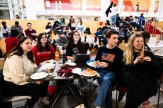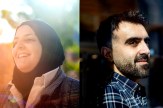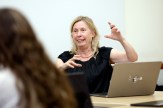Northeastern joins the Trinity Challenge as founding partner to stop the next pandemic before it starts

The COVID-19 pandemic has laid bare the necessity of a united, networked approach to solving international health and economic catastrophes.
In a global effort to ensure that health emergencies don’t upend economies and societies in the future, Dame Sally Davies, master of Trinity College, Cambridge and former chief medical advisor to the United Kingdom, has brought together Northeastern University, Microsoft, Google, the Bill & Melinda Gates Foundation, and many other industry and public sector organizations to collaborate on preventing the next pandemic.
The Trinity Challenge, a global competition and consortium, will encourage, reward, and promote the best ideas and solutions to predict, prevent, and respond to outbreaks and pandemics using data and analytics.
Northeastern’s contributions to the Trinity Challenge build on a series of critical work by the university’s faculty and research institutes.
“The world’s biggest problems cannot be solved by a single institution or even a single sector,” said Joseph E. Aoun, president of Northeastern. “We have to join forces across traditional boundaries if we’re going to prevent the next pandemic. The Trinity Challenge is a groundbreaking idea to unite key global players whose contributions will change the course of our future.”
Researchers, including Alessandro Vespignani, director of the Network Science Institute and Sternberg Family distinguished university professor of physics, and his team, have been modeling the pandemic’s spread and impact across continents. The World Health Organization, public health agencies, the White House, and governments around the world frequently rely on the team’s projections to make decisions.
Ameet Pinto, professor of civil and environmental engineering, has developed sewage-based testing technology to monitor for the presence of SARS-CoV-2 in wastewater. His work has been successfully implemented in partnership with the city of Somerville, Massachusetts.
The Trinity Challenge launches on Monday, Sept. 14 with proposals due by January 2021. Funding in the amount of £10 million will be available for participants to support innovations across areas of economics, behavioral science, and data analysis and collection.
“We need new ways of working, new partnerships, new ideas, and believe that together this strong and growing coalition can and will generate acts that protect and improve lives and livelihoods everywhere,” Davies said in a press release.
Right now, one of the most serious obstacles to epidemiological progress is a lack of organized information, says David Luzzi, senior vice provost of research and a member of the Trinity Challenge’s steering committee, especially since so much of personal health data is private.
“One of the big questions is: How do we make the data accessible for the people who are going to participate in the challenge?” says Luzzi. That’s where founding members come in, many of whom have access to large datasets.
“Most of the data we need to use is held by private companies like telecommunications companies or hospital systems,” said Samuel Scarpino, assistant professor of marine and environmental sciences who has been part of a global effort to gather publicly available data on individual cases of COVID-19. “Getting access to that information and finding people to interpret that data requires coordination on both legal and ethical fronts.
The proposals should address three stages of a public health crisis—identification of the pathogen, mitigation of the disease, and economic and social recovery.
Successful proposals will maximize effectiveness and minimize cost to develop early-warning technology systems and protocols for targeted interventions.
But even though there will be a vetting process for submissions and awards for the most promising proposals, this is more of a challenge than a competition. “There’s no single winner,” says Luzzi. “It’s about solving the pandemic and preventing future emergencies.”
“We want to tap into the brightest minds in the world,” he says. “We’re hoping for some brilliant surprises.”
For media inquiries, please contact media@northeastern.edu.





